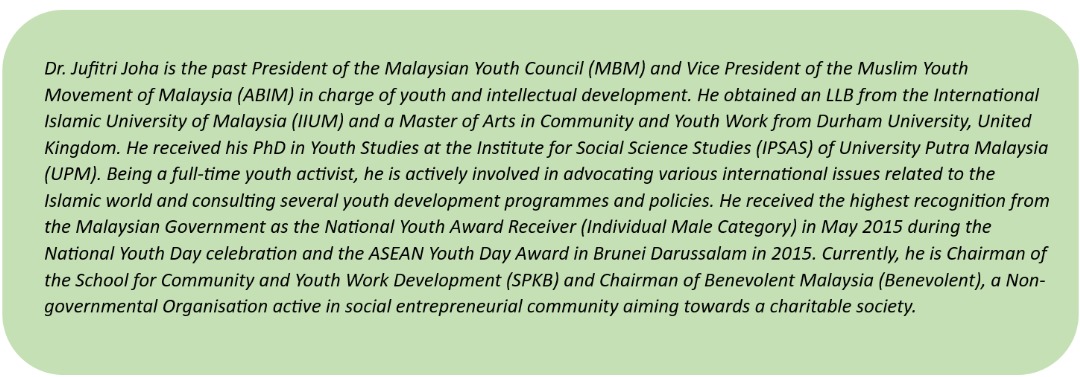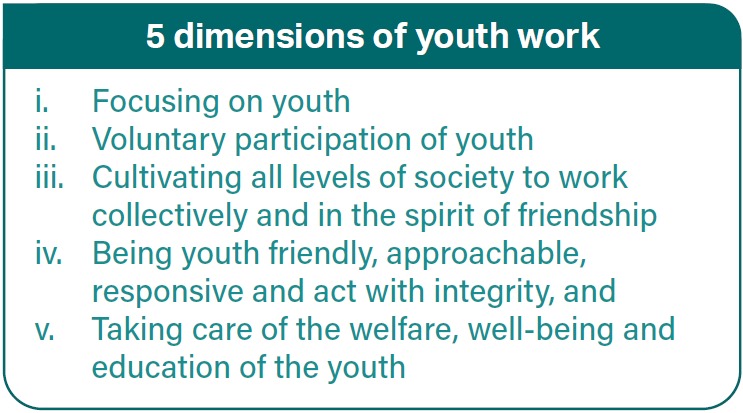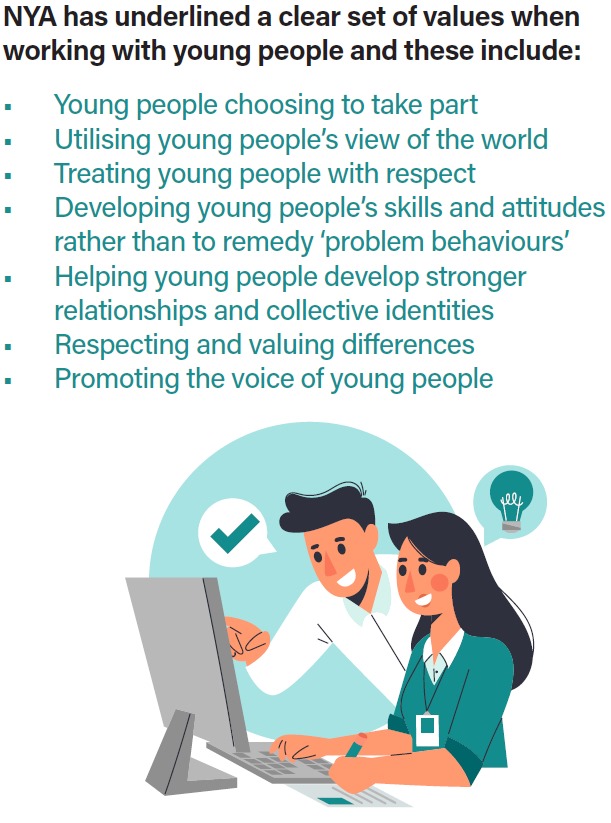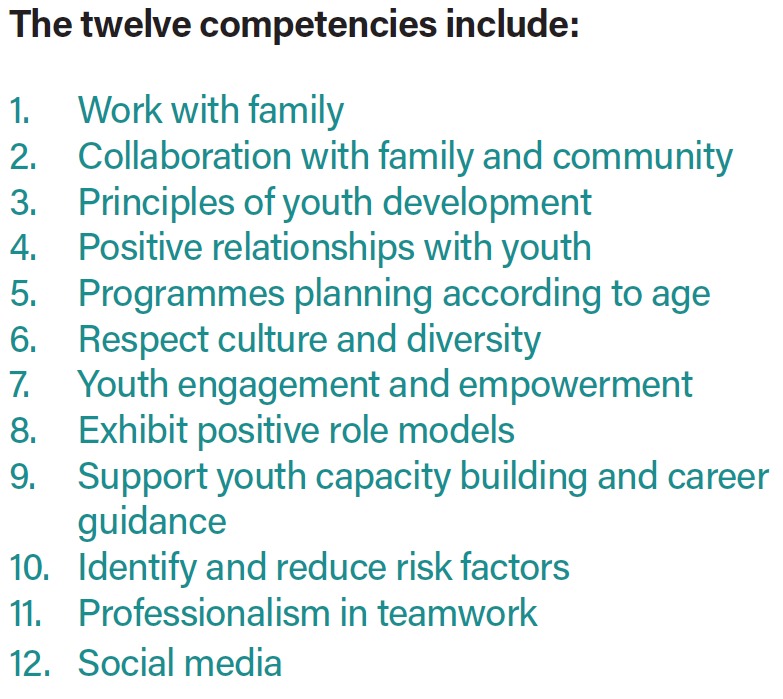by | Dr. Jufitri bin Joha
Chairman, School for Community and Youth Work Development (SPKB)
Chairman, Benevolent Malaysia (Benevolent)

Professional youth work in Malaysia is still new and many still need to understand the concept. Many think youth workers are workers in various sectors, and this misconception needs clarification.
Youth work as according to the National Youth Agency (NYA), one of the leading youth work agencies in the United Kingdom, is a distinct educational process with a variety of programmes to support a young person’s personal, social and educational development needs. Youth workers or youth work practitioners are individuals who educate and nurture these young people in the areas mentioned above, including the youngsters’ personality and career development in becoming perfect adults and effective citizens of the future.

Currently, youth work in Malaysia has been practiced without professional accreditation. Most of the youth work practitioners in Malaysia, whether those working in the Ministry of Youth and Sports (KBS) or involved in youth movements such as the Malaysian Youth Council (MBM) or any institution that develops young Malaysians, do not any have specific qualifications and recognition in professional youth work.
In line with other Commonwealth countries in promoting professional youth work, Malaysia must take firm initiatives to mobilise youth development as a core activity and not just to fill up free time. In order to achieve developed nation status, Malaysia need not only expand physically but too also cultivate her people to be a balanced society with spiritual, emotional and intellectual equity – and this begins with the young.
The Malaysian Youth Policy (DBM) 2015-2035 has taken steps to list professional youth work as one of the 10 main areas of national youth development. Starting in 2015, KBS and MBM have taken aggressive steps to mobilise professional youth work until successfully producing the National Occupational Skills Standards (NOSS) for youth work. In addition, Universiti Putra Malaysia (UPM) will be offering a youth work degree by the end of 2023. These are two of the main mechanisms for the recognition of professional youth workers in Malaysia apart from the third mechanism which is through the recognition of past achievements and experiences.
To this accord, the National Federation of Youth Workers (FKPB) and the Youth and Community Work Development School (SPKB) were established to further promote youth work in Malaysia in addition to looking at the direction and welfare of Malaysian professional youth workers themselves. Not only that, as a leading country in professional youth work, alongside other Commonwealth countries such as the United Kingdom, Jamaica, Singapore, Australia, India and New Zealand, Malaysia, through SPKB, has joined the Commonwealth Alliance of Youth Workers Association (CAYWA) to promote youth work at the global level.
At the national grassroots level, Adab Youth Garage (AYG) is one of the institutions or civil society organisations (CSOs) that promotes professional youth work in the country. According to Professor Dr. Abdul Lateef (2023) from UPM’s Institute of Social Science Studies (IPSAS), AYG is a community-based youth serving organisation that operates in 10 low income communities in Selangor, Kuala Lumpur, Penang, Negeri Sembilan and Johor – namely at the People’s Housing Programme (PHP) areas, a low-cost community housing project. AYG establishes youth engagement centres with the aim to mobilise young people and community stakeholders towards social change and positive youth development.
In the pursuit of rapid national development, where adults are busy earning a living, youth and family development are often overlooked. Adding to this the challenge, the imminent urban decay with families being squeezed into small homes, educational neglect, lack of quality family boding, will eventually lead to dwindling motivation and positive supervision among the children. Without a doubt, living environment greatly affect the development of our youth, particularly their mental state.
Hence, to aid the children of our inescapable rat race existence, the presence of professional youth work is both compelling and timely. The nature of youth work can help prevent drop outs – through informal education, talent development activities and highlighting youth potential. Youth work sees young people as an asset to be developed and not a liability whose problems must be solved. Young people must be respected and valued in professional youth work ethics and values.

This code of ethics is comprehensively debated by the United Kingdom’s Institute for Youth Work (IYW). Anyone interested can read more about this on the IYW website.
To take this professional youth work agenda more seriously, Malaysia should have special acts to regulate it and recognise youth workers as professional workers. Job opportunities in this sector can also be created to provide ample employment in this sector.
This matter requires high political commitment and community support at all levels. Nowadays, educating the young is not only the task of teachers and lecturers in formal educational institutions, but is also the task of professional youth workers in informal education settings. Both sectors are necessary and even complement each other in developing a balanced person. The Ministry of Education and KBS must work hand in hand in order to succeed. The professional youth work sector is also believed to be able to deal with the problem of student dropouts, even honing leadership skills among the young through youth movement participation.
In this increasingly challenging era, the youth development sector desperately needs workers and youth work practitioners who are trained and able to handle the young generation who have very different characters and thinking. In addition, the post-pandemic challenges that have witnessed changing trends and culture among the young generation which is very worrying. These challenges and problems require effective, creative and innovative professional youth workers – a job that needs to be given full time mode.
A study led by Emeritus Professor Azimi Hamzah (2015) outlines at least 12 competencies for Malaysian youth workers that serve as benchmarks for the basic framework and meet the standards so that youth workers get a precise and clear direction to improve work performance towards the best.

These are some of the important competencies and skills required to become a professional youth worker during the 2015 study and most of them have been adapted in the youth work NOSS.
It is certain that with the rapid development of the country’s post-Covid19 progress and the unique character of the younger generation, professional youth workers need to equip themselves with more competencies and skills. The increase in mental health problems has forced youth workers to learn advanced skills, for example how to handle the mental stress experienced by the younger generation, or how to work together with psychiatrists in dealing with these problems. The approach of youth work is to prevent before the problem becomes severe, where youth workers need to come up with methods and programmes for education and early prevention from youth suffering chronic mental health.
The hazards of technology and digital gadgets is another problem for young people. During the pandemic era, the lack of opportunity for the young to carry out physical activities outdoors caused stress among them, and in turn they opt for the electronics to keep themselves busy, a habit that stuck even at the post-pandemic phase. When that happened, CAYWA’s professional youth workers started the digital youth work to reach as many young people as possible through online platforms. By reaching the youth digitally during the pandemic era, the youth workers were able to slowly and surely attract those youth to the physically participate in activities at a later stage. Therefore, professional youth workers should master social media because young people nowadays communicate more online, than physically.
In conclusion, although professional youth work is still new in Malaysia, its importance is increasing. Young people are not without potential, but most of them are not given the opportunity, or guided properly. Professional youth workers are like sports coaches who can polish talents and nurture the personality of young people. Professional youth work must be supported holistically and at a long term basis – all for the good of our youth, the asset of our country.
Let us all work together to develop both the youth and the future.








